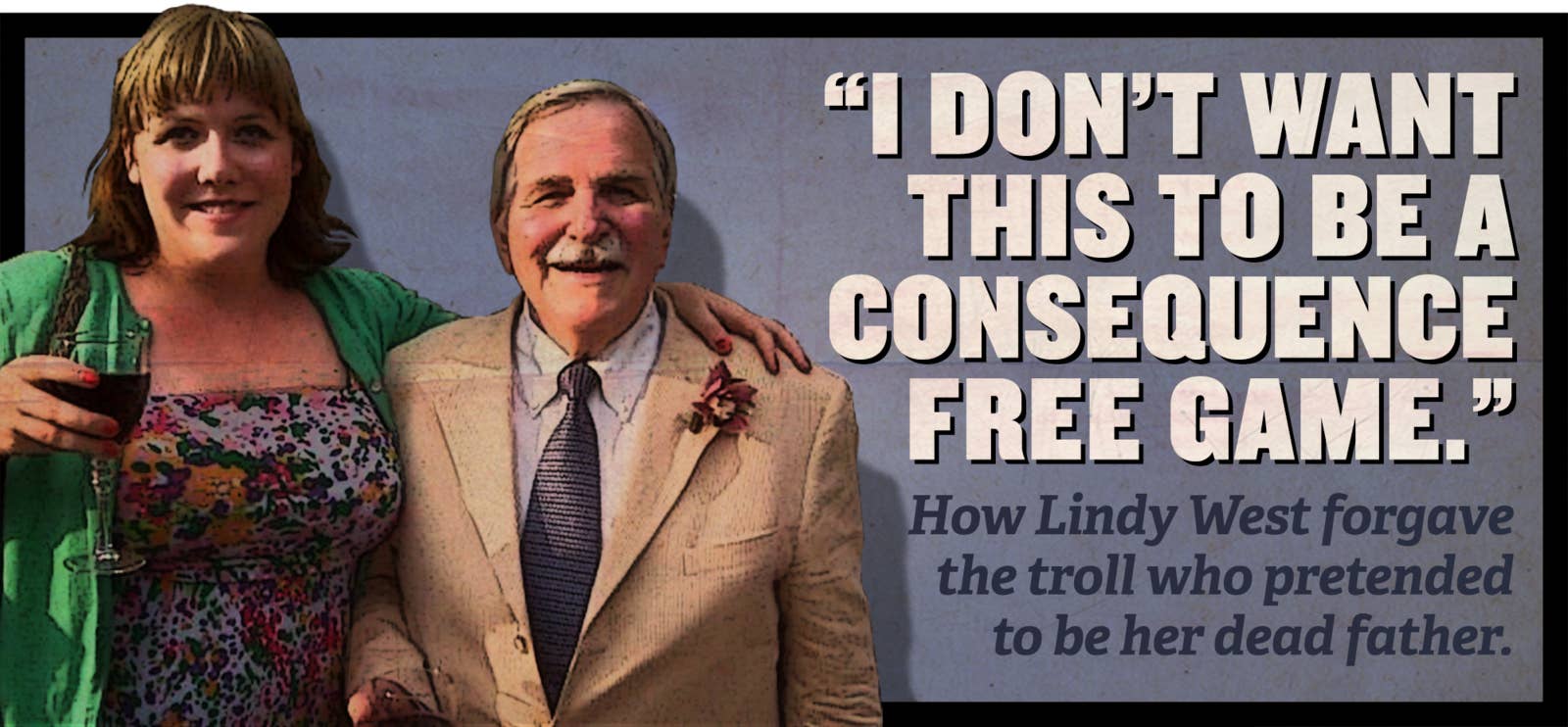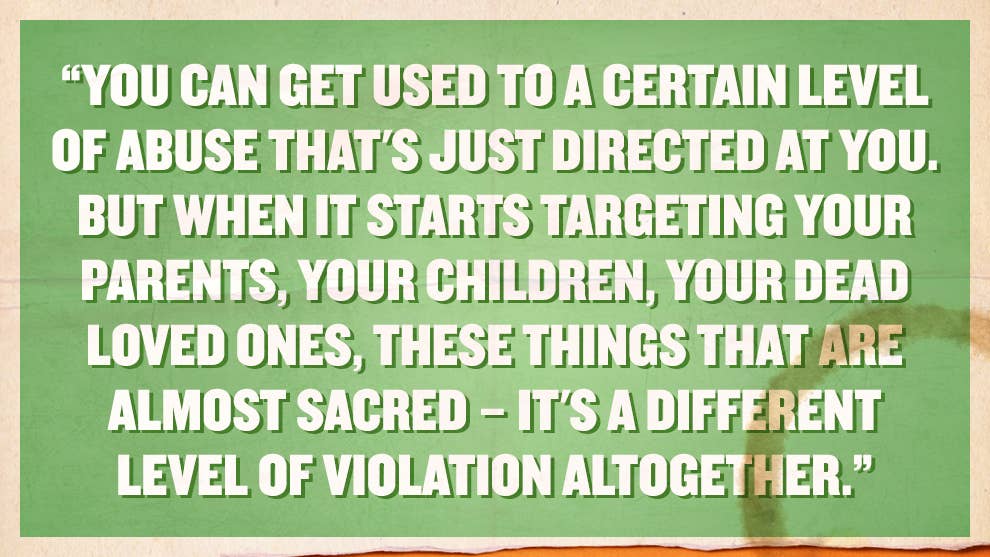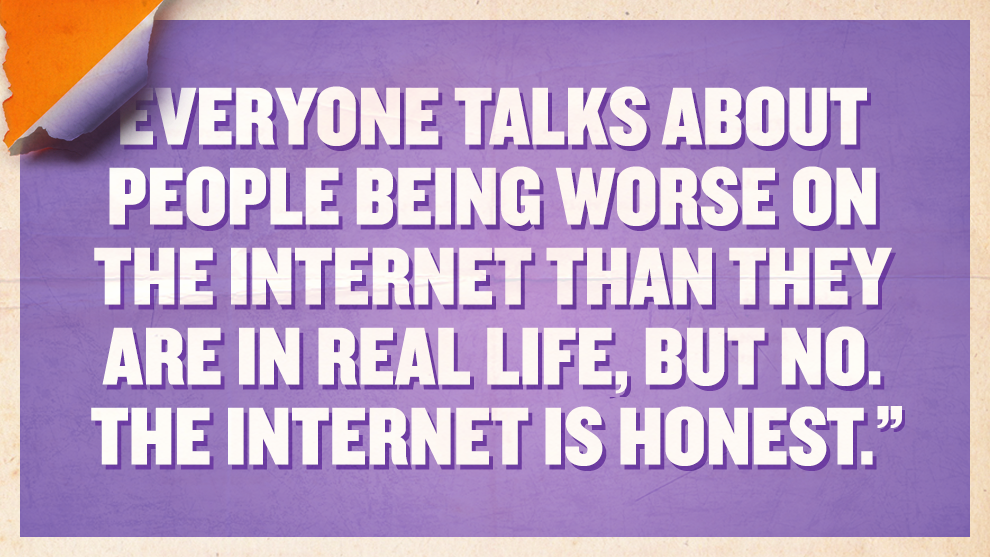
In the summer of 2013, Lindy West made an appearance on television to talk about rape and misogyny in comedy. A journalist and comedy fan, she spoke about her concern that victim-targeting rape jokes contributed to a culture that trivialised rape.
In response to her comments, she received abusive comments online, including:
"I love how the bitch complaining about rape is the exact kind of bitch that would never be raped."
"Lindy West is a fat cunt who is completely unfuckable."
"Holes like this make me want to commit rape out of anger."
"You're fat, ugly, and unfuckable. You don't have to worry about rape!"
"No one would want to rape that fat disgusting mess."
"There is no way a straight dude would fuck or even rape that ugly heifer."
"I just want to rape her with a traffic cone."
As the stream of abusive comments flooded on to her laptop screen, one follow notification on Twitter stood out. She instantly recognised the person in the photo used as the avatar of the account: It was her father, who had died in December 2011. She'd looked fondly at the cherished snap – which showed her father sitting at the piano in the living room of her family home – countless times. Now a stranger on the internet was using it for a fake parody account.
"I don't think the account ever actually tweeted directly at me – I just got this follow notice and then screengrabbed, reported, and blocked it immediately," West tells BuzzFeed News. "I didn't believe it at first, I thought I must have been misreading it. But I wasn't, unfortunately."
The account's name, she says, was "Paul West Donezo" – because her father's name was Paul West, and because, following a difficult battle with prostate cancer, he was "donezo" (done). The description of the account read: "Embarrassed father of an idiot – other two kids are fine, though."
West had a close relationship with her father. She speaks warmly about her memories of him, and describes him as a funny, principled, "spectacular human being". Paul was a musician who used to wake her up to the sound of him playing the piano.
"He was the most universally beloved human being I've ever met," West says, "and he never said an unkind word about anyone, ever. Except for George W. Bush."
The person who made the account had thoroughly researched her family and found out her father's name and life story, and knew how recently he had died.
"You can get used to a certain level of abuse that's just directed at you," West says. "But when it bleeds into other areas, when it starts targeting and affecting your parents, your children, your dead loved ones, these things that are almost sacred – it's a different level of violation altogether.
"To lose someone is difficult enough, but to then have that loss used against you in such a cruel way is awful."

A little while later West wrote about the experience with the parody account of her father, and how it hurt her, for Jezebel.
In response to the article, she received the following anonymous email:
Hey Lindy, I don't know why or even when I started trolling you. It wasn't because of your stance on rape jokes. I don't find them funny either. I think my anger towards you stems from your happiness with your own being. It offended me because it served to highlight my unhappiness with my own self.I have emailed you through two other Gmail accounts just to send you idiotic insults. I apologize for that. I created the paulwestdonezo@gmail.com account and Twitter account. I have deleted both.
I can't say sorry enough. It was the lowest thing I had ever done. When you included it in your latest Jezebel article, it finally hit me. There is a living, breathing human being who's reading this shit. I'm attacking someone who never harmed me in any way and for no reason whatsoever.
I'm done being a troll. Again, I apologize. I made a donation in memory to your dad. I wish you the best.
Not only did the internet troll who had pretended to be her father apologise for their actions, but they attached a receipt for a $50 donation to Seattle Cancer Care Alliance, the cancer care home that looked after her father, and dedicated the donation to him.
West replied to the email saying: "Is this real? If so, thank you."
The man replied to apologise again, and this time revealed his real name. However, West decided not to "out" him publicly as the man who parodied her father online.
"I just don't know what that would have accomplished," she says. "He had clearly done a lot of work on himself, and undergone a tremendous amount of personal growth. He didn't have to reach out to me and apologise, but he did. I don't think it would have set a particularly constructive precedent for me to punish him for that."
She explains that she's not a vindictive person, and that she did her advocacy work because she genuinely wants the world to be a kinder, fairer place, not because she "hated men".
Later, the producers of the radio show This American Life coordinated a phone conversation between West and her troll in which they spoke for two and a half hours. She found out that he was "normal" and has a girlfriend who loved him, as well as female friends and colleagues in his life, none of whom knew that he had trolled other women online. He told her he didn't troll any more and that he'd changed as a person after realising he trolled because he was living an unhappy, "passionless" life.
"He was a seemingly normal dude who'd gone through a dark time," she says, speaking about why she decided to accept his apology. "It drove home for me that dehumanisation is profoundly unhelpful."
In the phone conversation, he told her he disliked her writing, and that he felt that way because she was a woman:
The troll explained how he found out who her father was and how he set up the troll account. He then told West how he felt when he tweeted her using her dead father's photo:
"And I truly am sorry about that."
She replied: "Yeah, I mean, have you lost anyone? Can you imagine? Can you imagine?"

Receiving abusive messages or unwanted, intrusive comments is an everyday experience for women online, and one that is often dismissed by people who say: “Why don’t you just ignore them? Don’t feed the trolls. Don’t talk back.”
For West, this argument is ineffective. "I think it's a really easy, glib thing to say," she says. "My troll says it outright: If someone stopped responding (i.e. "feeding" him), he didn't stop trolling, he just moved on to troll someone else. And then – on my end – some other troll would just take his place. That is not a systemic solution. It's rearranging deckchairs on the Titanic."
Mocking, blocking, and taking the control away from trolls was empowering for her. She chose not to let it become a "consequence-free game" for the trolls, even if they were unaffected by her response. It's also better for her mental health: "I prioritise my mental health over their weird psychology, hands down."
But it's not just a case of personal well-being that encourages West to confront her trolls – she does it because she believes dealing with trolls directly and publicly brings attention to the issue. "None of that can be solved without zooming out and out and out and making as many people aware of this problem (and, more importantly, how it fits into systemic misogyny as a whole) as possible," she says.
Does she think it's important to warn aspiring women journalists about this type of abuse?
"I wish it weren't the case, but yes. Definitely. If women want to go into this field, they need to know how costly it can be, and I don't blame anyone for not wanting to take that on."
Even with her love of journalism, West has thought about quitting the field herself, and wants women who decide to pursue it to be prepared for the vitriolic abuse they may have to face – but to know also that women are there to support each other through the difficult times.
"A lot of people don't know that abuse and harassment are a constant that feminist writers are just expected to put up with as part of our jobs," she says. "And that doesn't exist in a vacuum – it's a symptom of entrenched, systemic misogyny and the way that men are socialised to conceive of and treat women."
Despite this bleak outlook, West isn't convinced that trolls are a permanent fixture of the internet. After she told her story to This American Life, Twitter CEO Dick Costolo announced that he was finally addressing the abuse that is rife on the site. West, like with many feminists and writers online, would like to see transparent anti-harassment policies from social media sites, effective block and report tools, and moderators trained to recognise and contextualise the harassment that women receive online.
"I love Twitter and I've made amazing friends and professional connections on there," she says. "Trolling is just the dark side of the incredible democratising power of the internet. The reason the backlash is so loud and fierce is because, for the first time, marginalised people can speak directly to power in a large-scale, public, collective way. From their living rooms and their libraries. Every day. I would never sacrifice that just to get rid of internet trolls."
But West doesn't believe that it's just the internet that fosters a hostile environment for women.
"I think the world is a hostile environment for women," she says. "The internet is just a convenient delivery system. Oppression likes to hide, and the internet illuminates the way that men talk about women with other men – all of a sudden that's public, that's reported and captured.
"Everyone talks about people being worse on the internet than they are in real life, but no. The internet is honest."
BuzzFeed News was given permission to use audio clips from an episode of WBEZ Chicago's This American Life – any time you see a small arrow, you can click it to hear Lindy and the troll speak.
